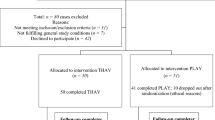Abstract
This study was undertaken to assess the effects of holding therapy on children who have a history of aggressive and delinquent behaviors. The study design was a prospective, pre-post, quasi-experimental controlled study. The subjects were recruited through the Attachment Center at Evergreen, Colorado. Eligible subjects were adopted children between the ages of 5–14 years, living in the present adopted home for at least one year. All children had a history of aggressive and delinquent behaviors, which prompted the contact with Evergreen. Findings resulted in significant decrease in the outcome variable for the treatment group within this study.
Similar content being viewed by others
References
Kazdin, A.E., Siegel, T.C., & Bass, D: Cognitive problem-solving skills training and parent management training in the treatment of antisocial behavior in children. J Consult and Clinical Psychol, 60, 733–747, 1992.
Robins, L.N.: Longitudinal studies: Sturdy childhood predictors of adult antisocial behavior. Psychological Medicine, 8, 611–622, 1978.
Garrison, S.T., & Stolberg, A.L: Modification of anger in children by affective imagery training. J Abnorm Child Psychol, 11, 115–130, 1983.
Lochman, J.E., White, K.J., & Wayland K.K.: Cognitive-behavioral assessment and treatment with aggressive children. In P. C. Kendall (Eds.) Child and Adolescent Therapy: Cognitive-Behavioral Procedures. New York: Guilford Press, 1991.
Federal Bureau of Investigation (1993). Uniform Crime Report for the United States 1992. Washington, D.C.: U.S. Department of Justice.
Walker, B., Goodwin, N.J., & Warren, R.C: Violence: A challenge to the public health community. Journal National Medical Association, 84, 490–496, 1992.
American Psychiatric Association DSM-IV: Diagnostic and Statistical Manual of Mental Disorders. 4th ed. Washington, DC: The Association, 1994.
Kazdin, A.E: Treatment of Antisocial Behavior in Children and Adolescents. Homewood, IL: Dorsey Press, 1985.
Werry, J.S., & Wollersheim, J.P: Behavior therapy with children and adolescents: A twenty-year overview. J Am Acad Child Adolesc Psychiatry, 28, 1–18, 1989.
Sanchez, L.E., Armenteros, J.L., Small, A.M., Campbell, M., & Adams P.B.: Placebo response in aggressive children with conduct disorder. Psychopharmacology Bulletin, 30, 209–213, 1994.
Slee, P.T. Family climate and behavior in families with conduct disordered children. Child Psychiat Hum Developm, 26, 255–266, 1996.
Bowlby, J: Attachment and Loss Vol. LII: Sadness and Depression. New York: Basic Books, 1980.
Egeland, B, & Sroufe, A: Attachment and Early Maltreatment. Child Developm Vol. 52: 44–52, 1981.
Levy, T, & Orlans, M: Intensive Short-Term Therapy with Attachment Disordered Children. Unpublished Manuscript, 1995.
Myeroff, R: Comparative Effectiveness With The Special Needs Adoptive Population. Unpublished dissertation, Union Institute, Cincinnati, 1997.
Barrett, T: Supporting drive fusion: Mitigating Destructive Aggression In Infants, Toddlers And Preschoolers. J Child Anal, Vol. 6, 128–151, 1995.
Achenbach, T, & Edelbrock, C: Manual for the Child Behavior Checklist and Revised Child Behavior Profile. University of Vermont, Burlington, 1983.
Quay, H.C., & Peterson, D.R: Interim Manual for the Revised Behavior Problem Checklist. University of Miami, Coral Gables, 1983.
Conners, C.K.: Rating Scales for use of drug studies with children. Psychopharmacology Bulletin: Pharmacotherapy with children. Washington DC: U.S. Government Printing Office, 1973.
Munroe, B., & Page, E.B. Statistical Methods for Health Care Research, 2nd ed. Philadelphia: J.B. Lippincott, 1993.
Lock, J & Strauss, G: Psychiatric hospitalization of adolescents for conduct disorder.Hospital and Community Psychiatry, Vol 45(9) 925–928, 1994.
Malone, R., Luebbert, J., Pena, A., Biesecker, K: The Over Aggression Scale in a study of lithium in aggressive conduct disorder. Psychopharmacology Bull, Vol 30(2) 215–218, 1994.
Offord, D., & Bennett, K: Conduct Disorder: Long-term outcomes and intervention effectiveness. J Am Acad Child Adolesc Psychiatry: Oct. Vol 33(8) 1069–1078, 1994.
Robins, L., & Price, R: Adult disorders predicted by childhood conduct problems: Results from the NMH Epidemiological Attachment Area Project. Psychiatry, Vol 54, 116–132, 1991.
Loeber, R: Antisocial behavior: More enduring than Changeable? Special Section. J Am Acad Child Adolesc Psychiatry, Vol 30, 393–397, 1991.
Author information
Authors and Affiliations
Rights and permissions
About this article
Cite this article
Myeroff, R., Mertlich, G. & Gross, J. Comparative Effectiveness of Holding Therapy with Aggressive Children. Child Psychiatry Hum Dev 29, 303–313 (1999). https://doi.org/10.1023/A:1021349116429
Issue Date:
DOI: https://doi.org/10.1023/A:1021349116429




